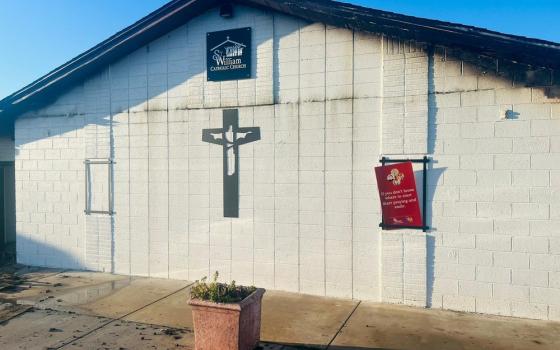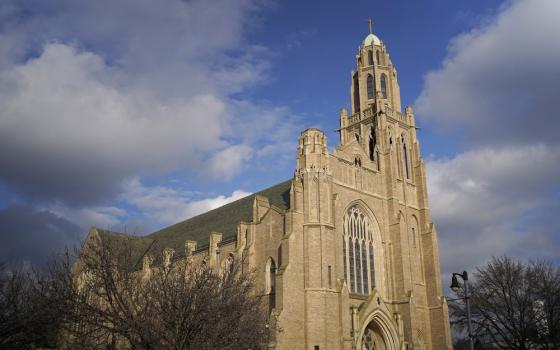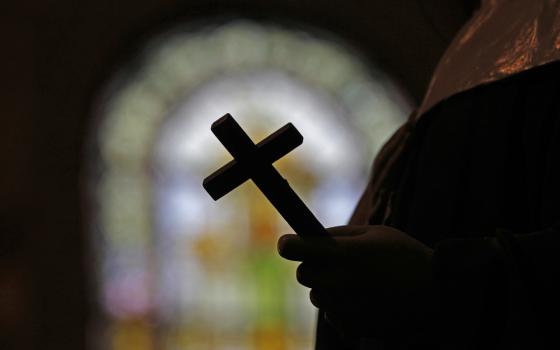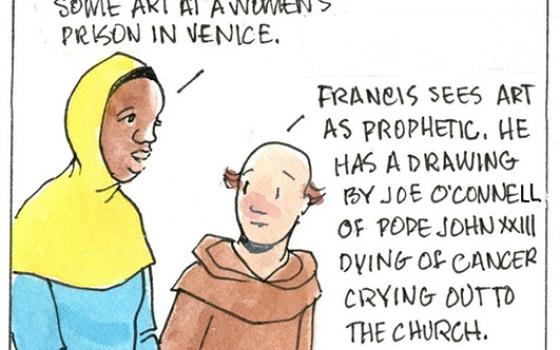Yesterday's news that Bishop Robert McElroy of San Diego is convoking a diocesan synod to consider how to embrace the Holy Father's apostolic exhortation Amoris Laetitia is both good news and important news. It is good, because too many bishops have sought to minimize or relativize the pope's exhortation. McElroy, like Washington's Cardinal Donald Wuerl, whose talk on Amoris Laetitia I discussed last week, does not seek to minimize the text but to embrace it, to take it seriously, and to respond to the invitations it contains. And, this call for a synod is important because Bishop McElroy is charting a path that I suspect more bishops will follow in the years ahead.
The most important part of the bishop's letter is not what he has to say about Amoris, although that is important. No, the most important thing here is the synod itself. Pope Francis is inviting the church to conduct its business differently, to change the church's from a strictly monarchical method to one that is rich in consultation and discernment, involving all the other bishops and the laity as well. This synodal approach has long roots in the history of both the universal church and the church in the U.S. The early ecumenical councils gave us the creeds that define the most basic tenets of our faith. The provincial and plenary councils of Baltimore in the nineteenth century entailed a practical collegiality that, in turn, led to the creation of a bishops' conference in the 20th century. And, of course, the church in Latin America has developed extensive consultations at all levels of the church in advance of their continent-wide meetings of CELAM every 10 years.
Synodality, as Pope Francis said at the last two synods on the family, is more than a different process, it is a different attitude. It requires listening as well as pontificating. It demands dialogue, not rote recitations of statements arrived at in advance of the kind that characterized synods before Francis. Synodality only works if those participating exhibit a certain humility about their own claims on the truth, a willingness to let the truth capture them rather than the other way round. After all, if we already have all the answers, there is nothing to discuss and no need for a synod. It is very encouraging that Bishop McElroy has chosen to implement an exhortation that resulted from two synods with a synod of his own.
As for the content of the announcement, McElroy does not adopt the restrictive approach taken by many bishops, most recently Archbishop Samuel Aquila of Denver, who penned a column that said the controversial Chapter 8 evidenced a "lack of precision" and insisted it must, repeat must, be read through the lens of St. John Paul II's apostolic exhortation Familiaris Consortio. Actually, as Jesuit Fr. Thomas Rausch explained in an important essay on the development of doctrine published in Catholic New World, all church teaching is read through the lens of the Gospel, and adapted to the pastoral needs of the time. In this case, specifically, I would say that the core problem with the conservative effort to restrict and relativize the meaning of Amoris Laetitia is that they highlight only one teaching, and neglect the rest, in defending the pastoral practice of not giving communion to the divorced and remarried. As became evident from the discussions in the Synod, the pastoral need of the time is to relate the church's teaching on indissolubility to its other teachings, such as the belief that the Eucharist is not a prize for the perfect but food for sinners. But, I digress.
The first point on which Bishop McElroy diverges from those who seek to minimize Amoris Laetitia comes in the very first sentence. He writes, "Last month, Pope Francis authored an authoritative teaching document on marriage and family life that he entitled 'The Joy of Love.' " This rebuts the assertion made by Cardinal Raymond Burke and others that the document is not actually a magisterial text.
The broad vision of Bishop McElroy is evident in the second of five specific topics he is asking the synod to consider, namely the challenge of forming a culture of invitation for unmarried couples. He acknowledges that the large number of Catholics who, for a variety of reasons, do not choose to get married in the church is a significant pastoral problem. And, he links it to the larger issue: The degree to which young adults are not involved in the life of the church at all. He notes that some depart over a specific disagreement but most simply drift away, church becomes less and less important and relevant to them. Bishop McElroy has already appointed a task force to address this issue, and their suggestions will be completed by the time the synod meets in October.
McElroy goes on to note the prevalence of cohabitation before marriage, and that this constitutes a pastoral challenge, but he cites the reasons people cohabit without thundering judgment against them. Not everyone who lives together, like not everyone who gets divorced, is thumbing their nose at the Church's teaching. And, whatever their reason, it is the obligation of the pastor to go out in search of them to bring them back to the fold. We can't just wait for them to knock on our doors.
As with the two synods in Rome, the item for the San Diego synod that will prove the most contentious is undoubtedly number 4, the ministry to divorced persons. Bishop McElroy writes, "Priests and parishes should make every effort to heal the wounds of divorced men and women through the sacraments, catechesis and social outreach." He goes on to invite the synod to look for methods of mercy and ways of reinstatement for the divorced and remarried. "Pope Francis, following the suggestion of the Synod, locates this way of mercy and reinstatement in the discerning conscience of the believer," he writes. He then adds this paragraph which will be the subject of intense discussion:
Pope Francis widens the focus for this internal reflection of conscience for a Catholic who is divorced and remarried by underscoring that the central question for conscience is, "What is my situation before God?" In conversation with a priest, the believer with humility, discretion, and love for the church and its teachings seeks to reflect upon their level of responsibility for the failure of the first marriage, their care and love for the children of that marriage, the moral obligations which have arisen in their new marriage, and possible harm which their returning to the sacraments might have by undermining the indissolubility of marriage. It is important to underscore that the role of the priest is one of accompaniment, meant to inform the conscience of the discerner on principles of Catholic faith. The priest is not to make decisions for the believer, for as Pope Francis emphasizes in "The Joy of Love," the church is "called to form consciences, not replace them."
These are words that do not adopt a restrictive stance towards the text but strike me as possessing the spirit of Amoris Laetitia to the full. Bishop McElroy, like Cardinal Wuerl, "gets it."
It is unfortunate that this topic of the divorced and remarried has dominated so much of the discussion about marriage and family life the past few years. It is not news that a train arrives on time, only when it derails. But, McElroy's text, like Amoris Laetitia itself, is really a rich and varied pastoral look at the church's teaching about marriage and family life, and how that teaching really can provide answers to the questions and the challenges of our day. Those who criticize the pope, and who will criticize Bishop McElroy, should at least acknowledge that never before in recent years has there been such a vibrant discussion about what the church teaches about anything!
A church document sometimes takes years to work its way down to the local level. For example, there are elements of the church's social doctrine articulated in Rerum Novarum that have still not been absorbed by some of the members of the church. On the other hand, some of the changes wrought by the Second Vatican Council, such as having Mass in the vernacular, took root almost immediately and in such a way that there is no going back. Amoris Laetitia looks like it will be somewhere in between. It will take work to absorb it, and more work to implement it, to accept and act upon the invitation the text contains to keep marriage from being an inwardly focused reality, and instead become a part of an evangelizing church. Bishop McElroy's decision to convoke a synod, and the pastoral statement announcing it, set a high water mark so far for embracing the pope's call.
[Michael Sean Winters is a Visiting Fellow at Catholic University's Institute for Policy Research and Catholic Studies.]








